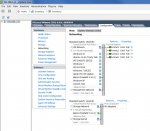I'm kind of disappointed at how my new build is performing. I had done a lot of research in advance about performance and I'm getting 1/3rd to 1/4 of the performance I was expecting out of this.
Here is my setup:
Xeon E5-2630L V3
32GB DDR4 ECC (24GB dedicated to FreeNAS)
ESXi 6.5 on USB
FreeNAS 9.10 (virtualized) on 2x USB datastores
2x 256GB SSD @onboard sata
6x 4TB HDD @onboard sata
Entire onboard SATA controller passed through to FreeNAS
2x SSDs are mirrored and shared back over to ESXi to host other VMs, irrelevant
6x HDDs in RAIDZ2
NFS shares for media/backups on HDDs
Here's a pic of my config

I've tried enabling autotune, but that seemed to have no effect whatsoever.
What else can I do to squeeze some better performance out of this?
Here is my setup:
Xeon E5-2630L V3
32GB DDR4 ECC (24GB dedicated to FreeNAS)
ESXi 6.5 on USB
FreeNAS 9.10 (virtualized) on 2x USB datastores
2x 256GB SSD @onboard sata
6x 4TB HDD @onboard sata
Entire onboard SATA controller passed through to FreeNAS
2x SSDs are mirrored and shared back over to ESXi to host other VMs, irrelevant
6x HDDs in RAIDZ2
NFS shares for media/backups on HDDs
Here's a pic of my config

I've tried enabling autotune, but that seemed to have no effect whatsoever.
What else can I do to squeeze some better performance out of this?


